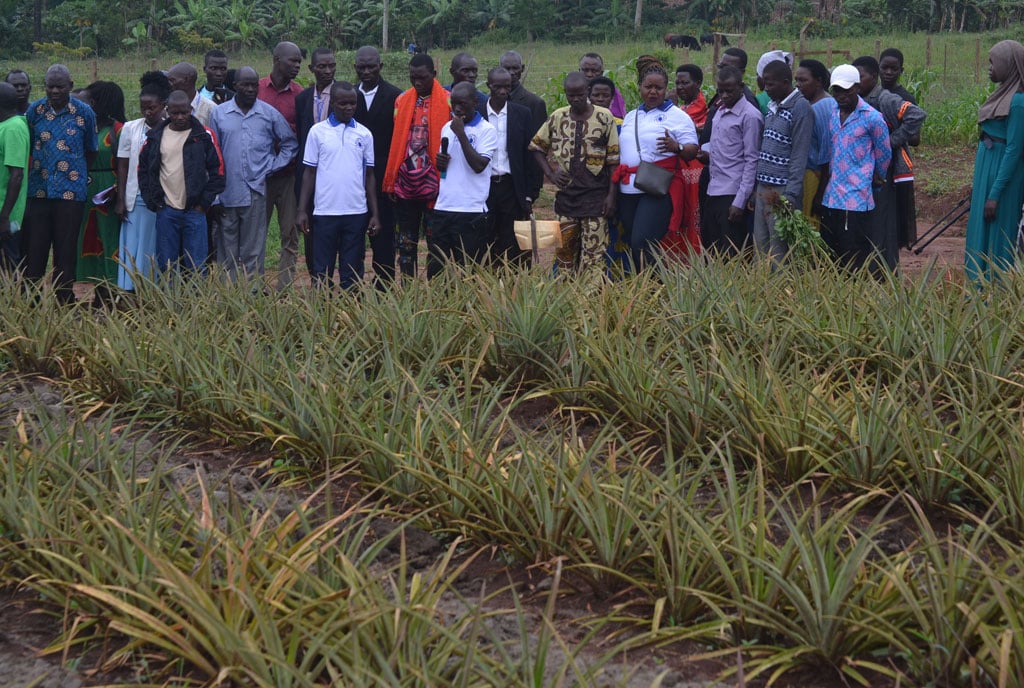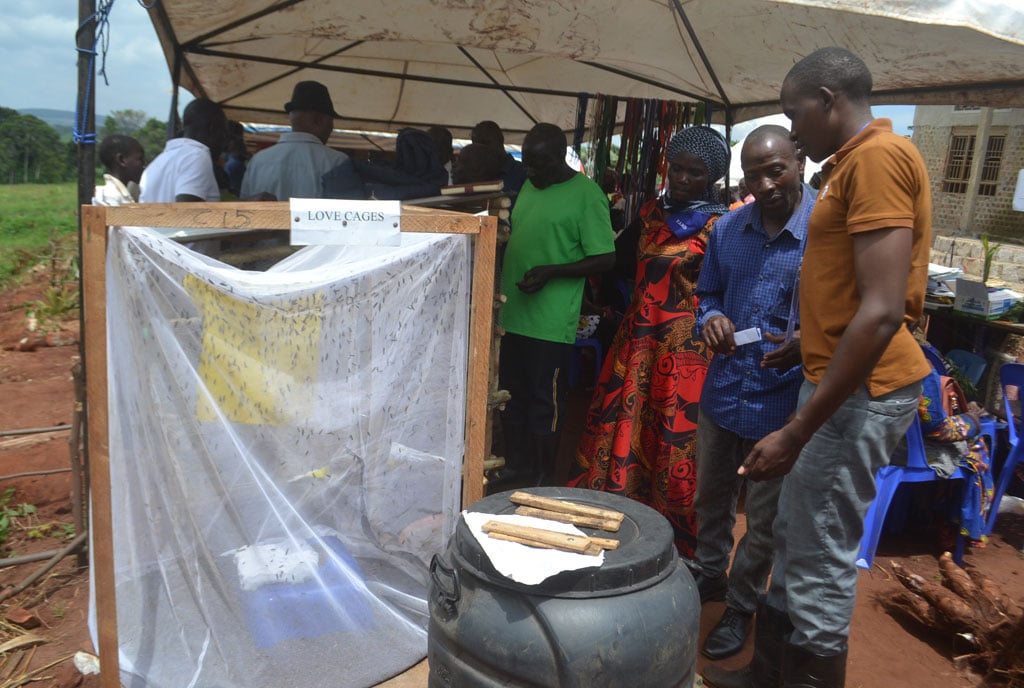Prime
Secrets of cashing in on agribusiness as taught at farmer’s fair

Agronomists at Youth Association for Rural Development (YARD) explain the best practices of growing pineapples during the training on Monday at the institute in Kabizi Village, Nyenga Sub-county. More than 200 farmers attended the training. PHOTO/DENIS EDEMA
What you need to know:
- With the lack of rain in some parts of the country, soils have become dry leading to defoliation of the crop quality and berry abortion.
Youth Association for Rural Development (YARD) an agricultural institute in Kabizi village, Nyenga sub-county, Buikwe District was the place to be on Monday for any discerning farmer seeking to grow their agribusiness.
The institute was a beehive of activity as tens of agriculture experts, agro-dealers and farmers congregated for the second edition of the farmer’s fair organised by Horizont3000, an Austrian development cooperation non-government organisation.
Driven by thirst for knowledge, the farmers came from far and wide, eager to engage the experts and pick as many lessons as possible from the event, whose theme was, ‘Unlocking farmer’s creativity for sustainable productivity, Improved livelihoods and environmental protection’.

Nobert Luigi Banio of HORIZONT3000 (left) and Dr Kremser (centre) listen to a point at the fare. PHOTO/DENIS EDEMA
Some came from Buikwe and its environs and others from the neighbouring Kayunga, Mukono and Jinja districts.
While there are those who travelled all the way from Tanzania. Others came from Tororo, Busia, Mbale, Rakai and Masaka districts.
And the farmers did not disappoint, shooting straight the questions as soon as the event got underway shortly after 9am. Jacob Kiryowa, a farmer from Jinja, said the farm fair, was timely.
“I will use the knowledge gained here to invest in value addition so that I process produce from my 10 acres. I plan to start processing honey to create diverse products for the market,” he said. The farmers later toured the eight-acre model farm for lessons on best growing practices as well processing and marketing.
Training
Dr Roswitha Kremser the head of Austrian Development Agency in Uganda urged farmers to practice proper farming. “Austria remains committed to this endeavour. We are here to give you knowledge and skills in better farming. While you farm, remember to protect the environment and also learn from your neighbour and always work together,” says Dr Kremser. Austrian Development Agency in Uganda is the main sponsors of the farming fair. Dr Kremer challenged the farmers to protect the environment as they farm. “As we farm remember to safeguard the environment,” says Dr Kremer.
Nobert Luigi Banio the programme coordinator of Enabling Rural Innovation (ERI) East Africa asked locals to embrace such training, noting that the knowledge received would play an important role in improving livelihoods. “ERI is a training methodology that will help the community in different ways. Today we come together to reflect what we have been doing in the past four years,” says Banio.
Godfrey Tenywa, a researcher at the institute, took farmers through best farming practices, from planting to harvesting and storage.
“Conducting a soil test is important. It enables one to know nutritional status of their farm and the kind of fertiliser ingredients one needs such as nitrogen, potassium and calcium,” advised the expert. Soil samples, explained Tenywa, should be extracted from at least three different parts of the farm.
“Dig between 0–30cm and collect the soil. Then put in a well-labelled envelop and bring to us or any other institution for analysis,” says Tenywa.
Crop defoliation
With the lack of rain in some parts of the country, soils have become dry leading to defoliation of the crop quality and berry abortion.
According to Tenywa, to cushion farmers from such climate change effects, intercropping coffee plants with trees such as grevillea and moringa helps provide shade to the crops ensuring longevity.
“This also helps to maintain the quality of coffee and improves its flavour despite the harsh weather conditions,” says Tenywa.

Godfrey Ssali displays some of the Lavae from black flies during the farmers’ fair. PHOTO/DENIS EDEMA
Apart from shading, farmers were also advised to spray foliar fertiliser on their crops as a short-term measure in the dry season to ensure flowering.
The use of irrigation and mulching was identified as the other ways to mitigate climate change effects.
Evelyn Nantongo an agronomist at YARD said mulching provides nutrients and ensures that soil contains enough moisture.
Joyce Birungi a lecturer and researcher at the institution, explained to farmers why they should choose varieties to grow wisely as the genetic makeup of a plant affects its susceptibility.
Acknowledging the role played by the second edition of the innovative fair, Birungi who is also the coordinator of YARD, said the fair created a platform for farmers to learn new skills, innovation and products on the market. “In such forums one learns new technologies in farming, innovations on production of food and cash crops, horticultural and extension services thus increasing production,” says Birungi.
She cited climate change as one of the biggest challenges facing farmers as she asked them to embrace improved seed varieties as a mitigation measure.
“Though the ancient seeds are readily available, they are not high-yielding. Climate change is real, and with the erratic rains we receive, we need to migrate to the improved varieties, which are not only productive, but tolerant to drought, pests and diseases,” she explained.
About ERI approach
For more than nine years now, HORIZONT3000 has implemented the Enabling Rural Innovation (ERI) programme in East Africa.
Through the four current partners (Caritas Tororo, YARD, Caritas MADDO and One World from Tanzania), communities are being empowered using the ERI approach to become self-reliant entrepreneurs engaging in market-oriented agriculture while safeguarding their food security and natural resource base.
Besides the cross-cutting issues, the five modules of the ERI approach, are briefly described below:
• Participatory Diagnosis (PD) – how farmers can understand their current situation, develop a desire for progress, and assess which resources and opportunities they have available to achieve their goals • Participatory Monitoring and Evaluation (PME) – how farmers can keep track of their progress towards achieving their goals and learn from successes and errors, in all spheres of life and activities. • Participatory Market Research (PMR) – how farmers can conduct market research to identify and analyse profitable markets and enterprises to improve their incomes and quality of life.
• Farmer Participatory Research (FPR) – how communities can farm better through; experimentation sustainable agriculture, agroecology, farmer field days, good agricultural practices, agronomy etc • Enterprise Development (ED) – how farmers can develop profitable enterprises and build sustainable business relations based on thorough business plans, market intelligence, contracts, record keeping etc.




